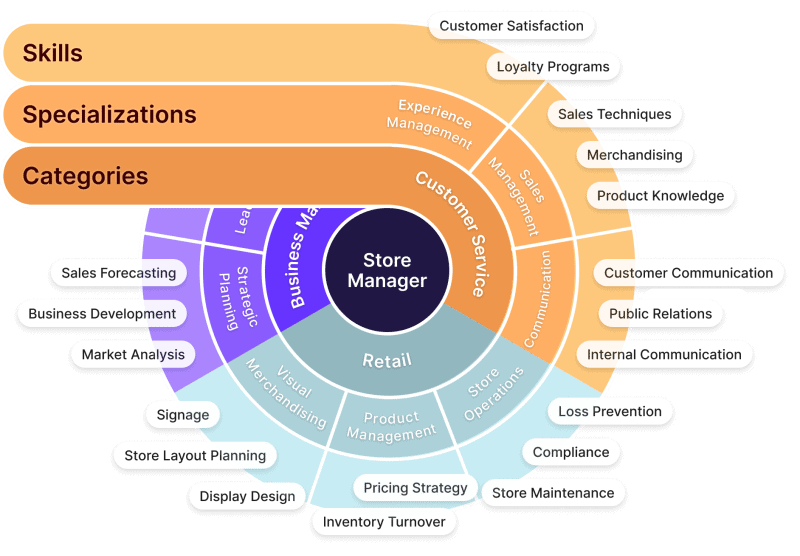When I’ve opened the Future of Jobs Report 2023, my first thought has been: “Writing an article about this will be difficult. It’s just too long but there are so many amazing things here that every CEO and management team should really digest and start thinking about”. So the next step has been for me to partially read and digest with ChatGPT (ChatPDF to be honest!) all the information here to write about the 3 most important trend I see here.
If you are working in a medium/large organization (200 people and above) I believe you should read this and try to understand how it correlates with your challenges when it comes down to people management in the next 5-10 years. A lot of these reports are usually targeting HR and Learning and Development audiences, and while there is ton of value here for them, I believe CEOs and C-levels in general are the ones that will understand the most what this mean for their companies in the future.
This one has a mix of big changes across technology, society and post-covid job market.
My take reading the report: how people think about work and skills
In one sentence: the way people think about their job is changing, and companies know that. This will be the biggest impact for companies in the period 2023-2027 and it confirms what I’ve been hearing and researching while preparing for Anthropos and studying what we should have focused on. While leading Cloud Academy for 10 years I’ve seen this shift happening in the market, but it accelerated a lot in the last 2 years.
People want a different relationship with their job
Overall, I think that the biggest trend is related to how our society is changing. People are looking at work and jobs in a different way, in most cases they are not ok with conditions that we assumed were normal for decades. This goes from switching from job to job until they find the right values, culture and career development to not being ok working for companies that don’t share their ideas or that have little transparency about their objectives. If we dive deep, we see that this is even more evident for younger generations: try to hire someone in their 20s and you will see what I mean. This is valid for all sort of jobs, blue and white collars.
Some of these trends are more evident in those large orgs with old-fashioned leadership: in these places you simply have more turnover and more issues getting people to commit to their organization. The main issues here are the lack of transparency about company’s values, data and overall performance, in addition to a strong lack of direction for career development. One of the reasons why we decided to start Anthropos is because we felt like many of these organizations don’t even have a clue of what’s happening inside their workforces, while people feel like numbers and are completely disconnected from the organization. In many cases it’s just a job you have to show up for, while you wait for something better.
This might sound a cliche, but young people don’t want to be numbers anymore. They are looking for a clear career path in the org, for constant learning of new skills and most importantly, they want to have an impact. It would be wrong to say that young people are not inclined to put in efforts to succeed, it’s quite the opposite in my opinion. They simply don’t do that anymore for companies that they don’t believe in.
The Job report is only mentioning some of these issues, but everything there is pointing to data and signals related to how the idea of work is changing.
Skills and jobs are changing rapidly – 44% of core skills are changing in the next 5 years
44% of current core skills will change between 2023 and 2027. The previous reports (this specific one started in 2016) had similar predictions, so this is a trend that has been happening for a while.
Still, the continuous change of probably the most important data here for C-levels to understand how hiring and re-skilling their people will change. There are a few interesting data when you look at skills and some of them will surprise you (they did surprise me!). We all know technology will continue to be the most important set of skills your workforce need to acquire, AI will be there as well and there is a lot there to think about (more in one of the trends below), but there are a set of skills that will be highly required and they are not the classic hard skills you think, look at this chart below:
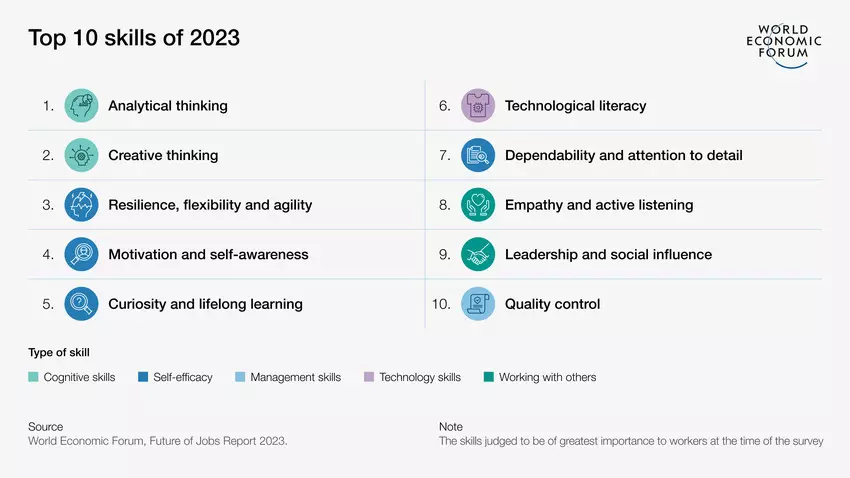
When you look at what kind of skills are becoming increasingly more important, there are definitely interesting data: AI and machine learning is the fastest growing, together with environmental stewardship, marketing and media, Leadership and social influence and design and user experience.
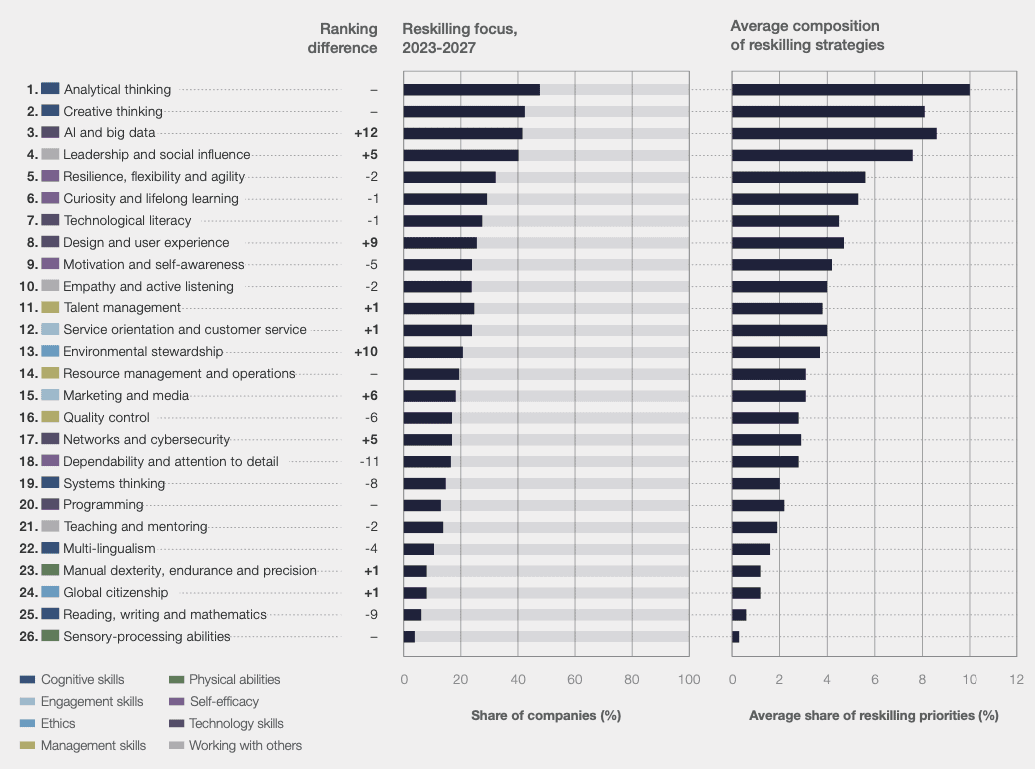
Companies are prioritizing skills training initiatives, with a focus on developing digital and soft skills. However, there is still a significant gap between the skills that companies need and the skills that workers possess. To bridge this gap, companies will need to work closely with educational institutions and governments to develop effective training programs and policies. If I look at the following chart, I think companies will need to completely rethink how they grow and develop their people, in a continuous way, not just when skills are changing more rapidly.
Why do I say this? Because if you look at how companies feel about hiring vs upskilling, they already know that finding new people will be more difficult than upskilling the existing workforce and preparing them for new roles inside the same organization.
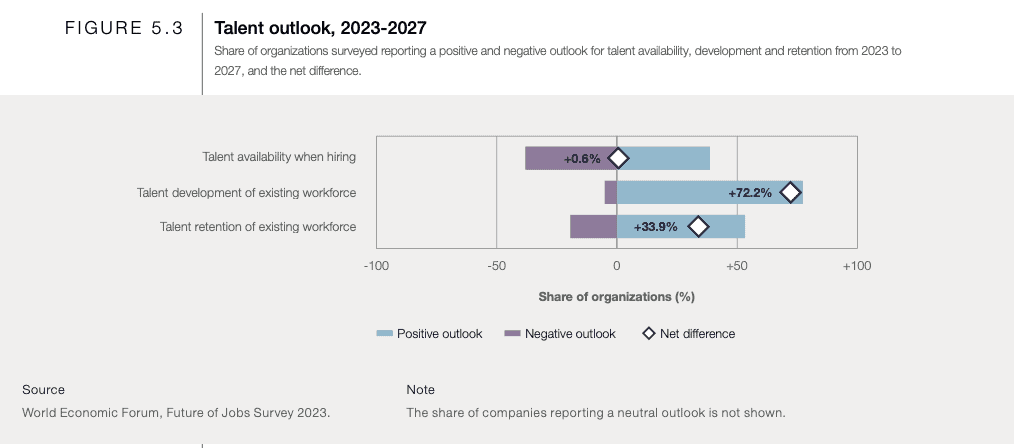
In addition to this, I cannot ignore how big it will be for some organizations to work on a variety of soft skills for their workforce. These are major transformations that require a lot of coordination, leadership buy-in and many tools to deploy it in an effective way. All of this while the outlook for finding that talent in the market doesn’t really look good.
My thinking is that these changes on the soft skills and attitude of people inside orgs, combined with a strong push for technology skills, will absolutely drive the agenda of CEOs in medium and large organizations.
Trend 1: AI and machine learning are quickly becoming critical skills
This is the part that surprised me the most in the report – how quickly AI is becoming part of a revolution inside companies.
Among technology skills, the ability to efficiently use AI tools now exceeds computer programming by humans, networks and cybersecurity skills, general technological literacy skills, and design and user experience by some margin. In the next five years, AI and big data will comprise more than 40% of the technology training programmes undertaken in surveyed companies operating in the United States, China, Brazil and Indonesia.
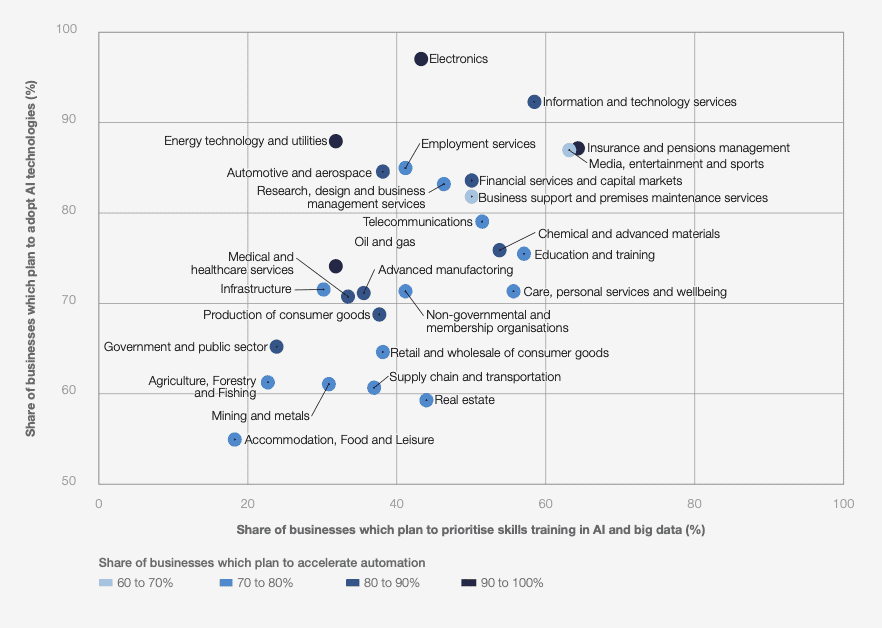
The chart of businesses planning to prioritize training on AI. I think the term big data is not really relevant anymore and a lot of these businesses will ultimately upskill their people on using generative AI and use that to digest and understand large quantity of data. On the other side there are many businesses that will simply accelerate on implementing AI inside their tools, services and products. And those will likely require even more AI-related skills to their people.
Leaders and CEOs need to start thinking about the AI impact today.
I generally look at generative AI and machine learning as strong opportunities to improve productivity in a lot of positions but I definitely think they will require a set of changes for companies. New skills but also new job roles that will need to change to adapt to AI. This is particularly true for white collar workers as many of our jobs will change and will increase in productivity thank to AI. If you think about any common role like product manager or software engineer they will be impacted by AI in a good way (these people will be able to do more, faster), but they will require new skills for people in those roles and the potentially a new definition of what those roles are in charge of inside the org.
Trend 2: Cognitive and soft skills will become more important
Some of you might connect this to the previous trend and look at it as obvious but I think there is more here for businesses. The report states that analytical thinking and creative thinking are still the two of the most important core skills for companies. There is no doubt that creative thinking is an aspect that every business values more due to the acceleration of AI and automation. People are constantly working on new products, services and on variations of those and creative thinking is still that unique skills that we will not be able to automate anytime soon: again, think about software engineers or product managers. It will be difficult to automate the creative process of solving a problem with code or building a new software that uniquely solves a problem.
Look at how quickly cognitive skills are growing in importance for companies:
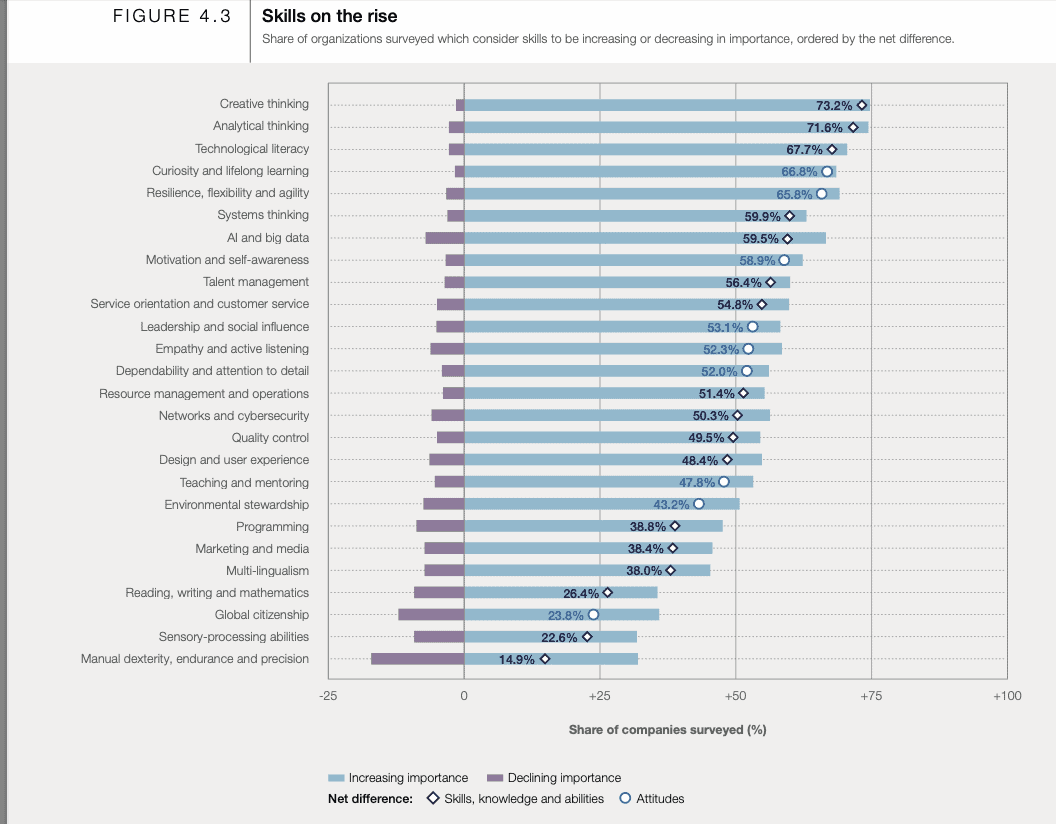
There are a lot more soft/cognitive skills listed here that should make every management team think about the actions they can take internally to invest in these type of skills for their people and how to “adapt” them to what the company needs. In my experience the challenge with promoting these skills is that your people in the org end up having a bunch of courses on LinkedIn Learning or other solutions that talk about creating thinking, but they cannot connect that to how the company operates, to its culture and how they should think about being creative in their organization.
I think this trend will force companies to invest more not only in upskilling their people but also in how they communicate and talk to their people. This is a somehow complicated process and it will require ton of changes in the platforms and solutions companies adopt to work with their people.
Trend 3: Workforce strategies are shifting more and more toward talent development
Companies are increasingly investing in upskilling and reskilling their existing employees to fill critical skill gaps rather than hiring new ones. This is because reskilling and upskilling programs can be more cost-effective than recruiting new talent, especially in industries where there are significant skills shortages. In addition, reskilling and upskilling programs can help companies retain their existing employees by providing them with opportunities for career growth and development. This can lead to higher levels of employee engagement and job satisfaction, which in turn can improve productivity and reduce turnover.
I think that the reality is that retention and talent development will be critical aspects for every organization in this decade. We will a big shift in how companies take care of their people and that will go from software solutions to how they will structure career development.
Stefano
May 10, 2023


